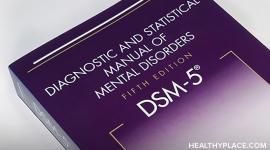Dissociative Disorder Symptoms: Living with a Dissociative Disorder

Dissociative disorder symptoms can range from mild, such as feeling out of one's body for a short period of time, to severe, such as long periods of dissociative amnesia or alternate personality states. No matter what, though, symptoms of dissociative disorders tend to be upsetting and take a toll on a person's work, home and personal life. Read some personal accounts of what it's like to live with a dissociative disorder, below.
Symptoms of a Dissociative Disorder
Dissociative Identity Disorder and Dissociative Amnesia Symptoms
A major characteristic of dissociative disorders is dissociative amnesia wherein a person will not remember important personal details that may be surrounding an event, time, person or another area. Additionally, in dissociative identity disorder, multiple alternate personality states ("alters") present themselves when a person is dissociative (often during times of stress).
Toril writes of her dissociative disorder symptoms:
"At the end of July, I had a really nasty argument with my sister one night because I wanted to stay up late but she said that if I did, I'd be grumpy in the morning, and she didn't want to deal with me being grumpy. It put me in a really bad mood and I went to bed at about 11pm. While I was talking to my significant other via Facebook in bed, I began to feel my protective alter, Alois, starting to wake up, wanting to cause trouble. Because I was already tired and grumpy, I didn't resist. Then suddenly, I could remember very clearly being knelt on a cold, hard floor in front of a naked skinny man. I won't go into explicit detail of what was happening, but I could feel it again as I was lying in bed. I wanted to scream but I couldn't open my mouth because that made the feeling more intense. After that night, Alois disappeared for about a month."
"Then, towards the end of August, I found a door in my mind, blocking out a memory. I instinctively knew that there was rape behind the door, but I couldn't quite believe it. For a few weeks, a new protector appeared, and he held the door shut for me when I needed him to. Then, on Sunday evening, I found out that a man who I have a personal connection with tortured and killed two boys, in front of his sons, one of which is a close friend of mine, and got away with it. Finding out about that really freaked me out. Then, in the middle of all of that, I could suddenly feel the rape happening, but not fully. I couldn't feel the pain, which I know must have been involved. Occasionally, I catch glimpses of the pain, but I haven't unlocked it fully yet."
Symptoms of a Dissociative Disorder: Depersonalization Disorder
Depersonalization disorder feels like an "out of body" experience and a major characteristic of depersonalization disorder is feeling like you're watching your life happen rather than living it.
Tony talks about depersonalization:
"One day I was walking around the city, minding my own business, when suddenly I found myself looking down at myself from somewhere near the awning of a store. It was unreal and the weirdest thing in the world!" he exclaimed, his hands shaking. "Since then, and that was 20 years ago, I've had one experience like that after another and never completely felt like I was back in my body. I constantly feel spaced out."
Depersonalization disorder can also be associated with drug use, such as the use of marijuana.
Brian writes about his symptoms of dissociation:
"My experience with some of these symptoms started one evening after smoking marijuana and having a panic attack while still under the effects of the drug. I freaked out, vomited, took a cold shower, and went to bed. From that point, it felt like time stopped. I literally thought I had died and entered the afterlife, because it felt like I had been suspended in time. I would look at the digital clock beside the bed, close my eyes for what seemed like forever, then reopen my eyes to discover a single minute had passed."
"I was distraught to still have the same feeling when I awoke the next morning. Over the next several weeks, I had severe issues with depersonalization/derealization. My body felt foreign to me. I felt like I was living inside of a dream. I felt completely disconnected from the life that was continuing around me."
". . . Although some of my symptoms lingered for a few years, they gradually subsided. The problem that hung on the longest occurred when I was driving at night. I would suddenly get a feeling that the world outside my windshield existed only in 2D, like playing an old-fashioned video game. It would cause such a surge of panic in my body that I would have to pull over and let someone else drive. Having conversations about eternity and space would often have the same effect."
The important thing to know about the symptoms of a dissociative disorder is that they can be treated, and go away.
Brian sums it up by saying,
"Today, I have little to no residual symptoms. I usually don't even think about it . . . even when it seems overwhelming and impossible to endure, there is hope. Talk to your doctor. Talk to your parents. Don't suffer in silence. You will get better!"
APA Reference
Tracy, N.
(2022, January 4). Dissociative Disorder Symptoms: Living with a Dissociative Disorder, HealthyPlace. Retrieved
on 2026, January 10 from https://www.healthyplace.com/abuse/dissociative-identity-disorder/dissociative-disorder-symptoms-living-with-a-dissociative-disorder



